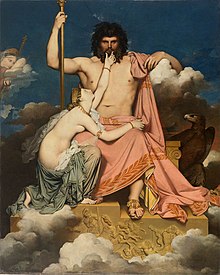| Name
|
Etymology
|
Mythology
|
Parent Mythology
|
Details
|
| Horus
|
From Late Latin Hōrus, from Ancient Greek Ὧρος (Hôros), from Egyptian ḥr.
|
Egyptian
|
Afroasiatic
|
In Ancient Egypt, Horus was ruler of the sky. He was shown as a male humanoid with the head of a falcon. It is not uncommon for birds to represent the sky in ancient religions, due to their ability to fly. However, in Egyptian mythology the sky was perceived as the goddess Nut.
|
| Tengri
|
Borrowed from a Turkic language; ultimately from Proto-Turkic *teŋri ('sky, heaven, god'). Compare Turkish tanrı ('god').
|
Turkic, Mongolic
|
Altaic
|
Chief god of the early religion of the Turkic and Mongolic peoples.
|
| Aten
|
|
Egyptian
|
Afroasiatic
|
Was a Monotheistic Sun God under the pharaoh Akhenaten.
|
| Wākea
|
|
Hawaiian
|
Austronesian
|
|
| Ranginui
|
|
Māori
|
Austronesian
|
The sky father and earth mother Papatūānuku, embraced and had divine children.
|
| Dyaus Pita
|
From Sanskrit द्यौष्पितृ (dyauṣ-pitṛ). From Proto-Indo-European *Dyḗws ph₂tḗr; synchronically analyzable as द्यौस् (dyaús, nominative singular of द्यु, dyú, 'sky') + पितृ (pitṛ́, 'father').
|
Indo-Aryan (Hinduism
|
Indo-European)
|
In the early Vedic pantheon, appears already in a marginal position, but in comparative mythology is often reconstructed as having stood alongside Prithvi Mata "Earth Mother" in prehistoric times.
|
| Jupiter
|
From Latin Iūpiter ('father Jove'), from Proto-Italic *djous patēr (literally 'sky father')
|
Italic
|
Indo-European
|
Often depicted by birds, usually the eagle or hawk, and clouds or other sky phenomena. Nicknames included Sky God and Cloud Gatherer.
|
| Zeus
|
From Ancient Greek Ζεύς (Zeús). From Proto-Hellenic *dzéus, related to Mycenaean Greek 𐀇𐀺 (di-wo /diwos/); from Proto-Indo-European *dyḗws.
|
Hellenic
|
Indo-European
|
| Dagr
|
From Proto-Germanic *dagaz ('day, name of the D-rune'). Cognate with Old English dæġ (Modern English day), Old Frisian dei, di, Old Saxon dag, Old Dutch dag, Old High German tac, tag, Gothic 𐌳𐌰𐌲𐍃 (dags). Ultimately from Proto-Indo-European *dʰegʷʰ- ('to burn').
|
Nordic
|
Indo-European
|
The personification of the daylit sky.
|
| Perun
|
|
Slavic
|
Indo-European
|
|
| Diepatura
|
|
Illyrian
|
Indo-European
|
|
| Zojz
|
A derivation of Proto-Indo-European *dyḗws
|
Albanian
|
Indo-European
|
|
| Perkūnas
|
From Proto-Balto-Slavic *Perkūnas, from Proto-Indo-European *perkʷunos, from *pérkʷus ("oak").
|
Baltic
|
Indo-European
|
|
| Týr
|
From earlier runic ᛏᛁᚢᛦ (tiuʀ), from Proto-Germanic *Tīwaz; identical to *týr ('god'). From Proto-Indo-European *deywós ('god'). Vṛddhi derivative of *dyew- ('sky, heaven')
|
Germanic
|
Indo-European
|
|
| Bochica
|
|
Muisca
|
Native American
|
In what is now Colombia, the Muisca worshipped this sky father.[2]
|
| Gitche Manitou
|
|
Native American
|
Native American
|
Common character in creation myths.[3]
|
| Shangdi
|
上帝 (Hanyu Pinyin: shàng dì; literally 'king above')
|
Confucianism
|
Sino-Tibetan
|
Supreme God worshipped in ancient China. It is also used to refer to the Christian God in the Standard Chinese Union Version of the Bible. In China, in Daoism, 天 (tian), meaning sky, is associated with light, the positive, male, etc., whereas 地 (di) meaning earth or land, is associated with dark, the negative, female, etc.
|
| Tian
|
天 (lit. 'sky' or 'heaven')
|
Confucianism
|
Sino-Tibetan
|
Used to refer to the sky as well as a personification of it. Whether it possesses sentience in the embodiment of an omnipotent, omniscient being is a difficult question for linguists and philosophers. Zhu, Tian Zhu (主, 天主, lit. 'Lord' or 'Lord in Heaven') is translated from the English word, Lord, which is a formal title of the Christian God in Mainland China's Christian churches.
|
| Tianfu
|
天父 (Hanyu Pinyin: tiān fù)
|
Taoism
|
Sino-Tibetan
|
Another word used to refer to the Christian God in the Standard Chinese Union Version of the Bible.
|
| An or Anu
|
(Akkadian: 𒀭𒀭, romanized: Anu, from 𒀭 an, 'sky, heaven') or Anum, originally An (Sumerian: 𒀭, romanized: An)
|
Sumerian, Assyrian and Babylonian
|
Sumerian, Assyrian and Babylonian
|
The father deity of the Sumerian and Assyro-Babylonian pantheon and is also the earliest attested Sky Father deity.
|
| Ukko
|
From Proto-Finnic *ukko. Probably a Finnic pet form of *uros ('man, male').
|
Finnish
|
Uralic
|
|
| Taevaisa
|
Taevas 'sky', isa 'father'
|
|
Uralic
|
The word by which adherents in Estonia of the Maausk (faith of the land) and the Taara native beliefs refer to God. Although both branches of the original Estonian religion — which are largely just different ways of approaching what is in essence the same thing, to the extent that it remains extant — are pantheistic, heaven has a definite and important place in the ancient pre-Christian Estonian belief system. All things are sacred for those of the faith of the land, but the idea of a sky father — among other "sacrednesses" — is something all Estonians are well aware of. In newer history, after the arrival of Christianity, the ideas of a sky father and "a father who art in heaven" have become somewhat conflated. One way or another, the phrase taevaisa remains in common use in Estonia.
|
| Urcia
|
|
Basque
|
Vasconic
|
The Liber Sancti Iacobi by Aymericus Picaudus tells that the Basques called God Urcia, a word found in compounds for the names of some week days and meteorological phenomena.[4][5] The current usage is Jaungoikoa, that can be interpreted as 'the lord of above'. The grammatical imperfection of the word leads some to conjecture that it is a folk etymology applied to jainkoa, now considered a shorter synonym.
|
